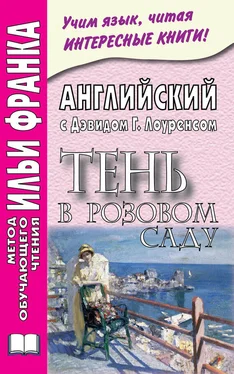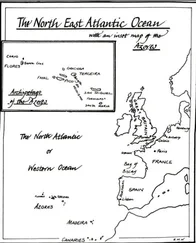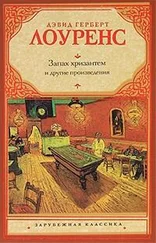
 “Not at all,” I said.
“Not at all,” I said.
“It’s a letter to my husband,” she said, still scrutinising.
I looked at her, and didn’t quite realise. She looked too far into me, my wits were gone. She glanced round. Then she looked at me shrewdly. She drew a letter from her pocket, and handed it to me. It was addressed from France to M. Alfred Goyte, at Tible. I took out the letter and began to read it, as mere words. “Mon cher Alfred” – it might have been a bit of a torn newspaper. So I followed the script: the trite phrases of a letter from a French-speaking girl to an Englishman. “I think of you always, always. Do you think sometimes of me?”
And then I vaguely realised that I was reading a man’s private correspondence(и тут я смутно понял, что читаю частную переписку /мужчины/) . And yet, how could one consider these trivial, facile French phrases private(однако как можно считать эти тривиальные легковесные французские фразы личными; facile – легкий; неглубокий, поверхностный ) ? Nothing more trite and vulgar in the world than such a love-letter – no newspaper more obvious(нет ничего более избитого и пошлого в мире, чем подобное любовное письмо – нет газеты более банальной; vulgar – вульгарный; заурядный, избитый; пошлый, мещанский; obvious – явный, очевидный; банальный, тривиальный ).
Therefore I read with a callous heart the effusions of the Belgian damsel(поэтому я читал с недрогнувшим сердцем излияния бельгийской мамзель; callous – мозолистый, огрубелый; черствый, бесчувственный; effusion – излияние; /душевное/ излияние; поток /слов, чувств/; damsel – /уст., тж. шутл./ девица, барышня ) . But then I gathered my attention(но затем я напряг внимание; to gather – собирать/ся/; скапливать/ся/; постепенно накапливать /какие-л. качества, свойства/ ) . For the letter went on, “Notre cher petit bébé – our dear little baby was born a week ago(ибо письмо продолжалось /такими словами/: наш дорогой малыш родился неделю назад; baby – младенец, ребенок; to bear – рождать, производить на свет ) . Almost I died, knowing you were far away(я чуть не умерла, зная, что ты далеко) , and perhaps forgetting the fruit of our perfect love(и, возможно, забыл плод нашей прекрасной любви; perfect – совершенный, безупречный, прекрасный ) . But the child comforted me(но ребенок меня утешил) . He has the smiling eyes and virile air of his English father(у него улыбающиеся глаза и мужественный вид /, как у/ его английского отца; virile – мужской; мужественный, сильный; air – воздух; вид, выражение лица ).

 And then I vaguely realised that I was reading a man’s private correspondence. And yet, how could one consider these trivial, facile French phrases private? Nothing more trite and vulgar in the world than such a love-letter – no newspaper more obvious.
And then I vaguely realised that I was reading a man’s private correspondence. And yet, how could one consider these trivial, facile French phrases private? Nothing more trite and vulgar in the world than such a love-letter – no newspaper more obvious.
Therefore I read with a callous heart the effusions of the Belgian damsel. But then I gathered my attention. For the letter went on, “Notre cher petit bébé – our dear little baby was born a week ago. Almost I died, knowing you were far away, and perhaps forgetting the fruit of our perfect love. But the child comforted me. He has the smiling eyes and virile air of his English father.
I pray to the Mother of Jesus to send me the dear father of my child(я молюсь матери Иисуса = Деве Марии , чтобы она послала мне дорогого отца моего ребенка; to pray – молиться; молить, умолять ) , that I may see him with my child in his arms(чтобы я могла увидеть его с ребенком на руках) , and that we may be united in holy family love(и чтобы мы могли соединиться в святой семейной любви) . Ah, my Alfred, can I tell you how I miss you, how I weep for you(ах, мой Альфред, могу ли я выразить, как я скучаю по тебе, как плачу по тебе) ? My thoughts are with you always, I think of nothing but you(мои мысли всегда с тобой, я не думаю ни о чем, кроме тебя) , I live for nothing but you and our dear baby(я живу лишь для тебя и нашего дорогого малютки) . If you do not come back to me soon, I shall die, and our child will die(если ты вскоре не вернешься ко мне, я умру, и наше дитя умрет) . But no, you cannot come back to me(но нет, ты не можешь вернуться ко мне) . But I can come to you(но я могу приехать к тебе) . I can come to England with our child(я могу приехать в Англию с нашим ребенком) . If you do not wish to present me to your good mother and father(если ты не хочешь представить меня твоим славным матери с отцом; to present – дарить; представлять ) you can meet me in some town, some city(то можешь встретить меня в каком-нибудь городке, каком-нибудь городе) , for I shall be so frightened to be alone in England with my child(поскольку мне будет так страшно одной в Англии с ребенком; frightened – напуганный, испуганный; to frighten – пугать; fright – сильный внезапный испуг ) , and no one to take care of us(где никто о нас не позаботится; care – забота; внимание ).

 I pray to the Mother of Jesus to send me the dear father of my child, that I may see him with my child in his arms, and that we may be united in holy family love. Ah, my Alfred, can I tell you how I miss you, how I weep for you? My thoughts are with you always, I think of nothing but you, I live for nothing but you and our dear baby. If you do not come back to me soon, I shall die, and our child will die. But no, you cannot come back to me. But I can come to you. I can come to England with our child. If you do not wish to present me to your good mother and father you can meet me in some town, some city, for I shall be so frightened to be alone in England with my child, and no one to take care of us.
I pray to the Mother of Jesus to send me the dear father of my child, that I may see him with my child in his arms, and that we may be united in holy family love. Ah, my Alfred, can I tell you how I miss you, how I weep for you? My thoughts are with you always, I think of nothing but you, I live for nothing but you and our dear baby. If you do not come back to me soon, I shall die, and our child will die. But no, you cannot come back to me. But I can come to you. I can come to England with our child. If you do not wish to present me to your good mother and father you can meet me in some town, some city, for I shall be so frightened to be alone in England with my child, and no one to take care of us.
Читать дальше
Конец ознакомительного отрывка
Купить книгу


 “Not at all,” I said.
“Not at all,” I said.











